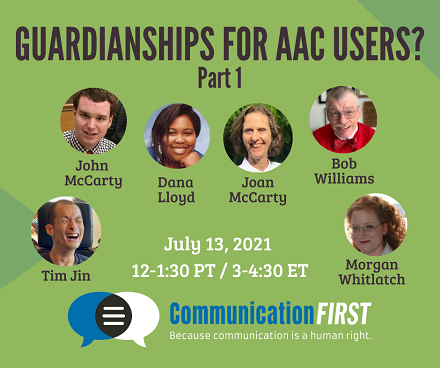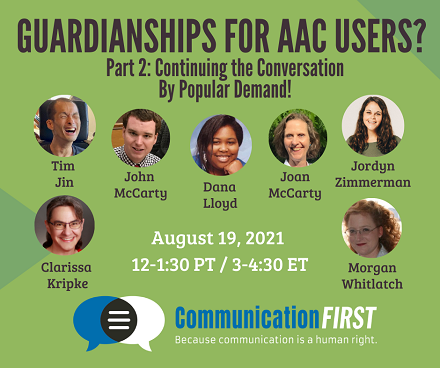Guardianships and conservatorships are legal tools that are frequently used in the name of protecting people who rely on augmentative and alternative communication (AAC) instead of speech to be heard and understood. Britney Spears’ recent advocacy to end her conservatorship has brought to the public’s attention the downsides of conservatorships and guardianships. But parents of people who cannot speak are regularly told guardianship is necessary. Is it? Are there benefits to guardianships for AAC users? What are the harms? What are the alternatives? In July and August 2021, CommunicationFIRST held two, 90-minute, talk-show-style conversations with AAC users, family members, and advocates about these important questions.
"I appreciated that the information was presented in an informational and non-confrontational format."
"The panel was excellent. As a parent the fear and pressure from medical professionals to get guardianship over my daughter with intellectual disabilities has been intense."
"I found every moment to be incredibly helpful and would watch it again if I could."
"The discussion format without slides etc was such a welcome change and made staying engaged with the conservation much easier."
"It was very powerful."
"This deepened my knowledge and I know I do not want guardianship now. Families need to know the alternatives and need support to see the possibilities."
"I plan to share what I learned with those I know that could advocate exploring supported decision making to families. I work in an elementary school and I plan to do more to advocate for autonomy and self-determination for our students as well as continue to inform and educate myself."
"Gives me a better idea of what I can do moving forward. Eventually, when my 32 yr old son feels ready I would like to start the process of removing conservatorship, if it is the right decision for him."
PART ONE
The first conversation took place on July 13, 2021, and featured:
- TIM JIN, CommunicationFIRST Board member & California-based AAC user
- DANA LLOYD, Program Director, Georgia Advocacy Office
- JOHN MCCARTY, the first AAC user in the United States to have successfully terminated a guardianship (via recorded video from Georgia)
- JOAN MCCARTY, mother & former guardian of John McCarty
- MORGAN WHITLATCH, JD, Legal Director, Quality Trust for Individuals with Disabilities & Lead Project Director, National Resource Center for Supported Decision-Making
- BOB WILLIAMS, Policy Director, CommunicationFIRST
- TAUNA SZYMANSKI, Executive Director & Legal Director, CommunicationFIRST (Moderator)
VIDEO: Watch the open-captioned, ASL-interpreted video recording of Part 1 here (with thanks to the Georgia Advocacy Office for generously captioning and redubbing the recording with ASL interpretation after Zoom settings conspired against accessibility!)
TRANSCRIPT: Access the transcript of Part 1 here
HANDOUT: Access the post-discussion resource handout here
PART TWO
By popular demand, we continued the conversation on August 19, 2021. Part 2 featured:
- TIM JIN, CommunicationFIRST Board of Directors & California-based AAC user
- CLARISSA KRIPKE, MD, Vice Chair, CommunicationFIRST Board of Directors & Clinical Professor of Family and Community Medicine, University of California San Francisco
- DANA LLOYD, Program Director, Georgia Advocacy Office
- JOHN MCCARTY, the first AAC user in the United States to have successfully terminated a guardianship (via recorded video from Georgia)
- JOAN MCCARTY, mother & former guardian of John McCarty
- MORGAN WHITLATCH, JD, Legal Director, Quality Trust for Individuals with Disabilities & Lead Project Director, National Resource Center for Supported Decision-Making
- JORDYN ZIMMERMAN, CommunicationFIRST Board of Directors & Ohio-based AAC user and graduate student
- TAUNA SZYMANSKI, Executive Director & Legal Director, CommunicationFIRST (Moderator)
VIDEO: Watch the open-captioned, ASL-interpreted video recording of Part 2 here
TRANSCRIPT: Access the transcript of Part 2 here


